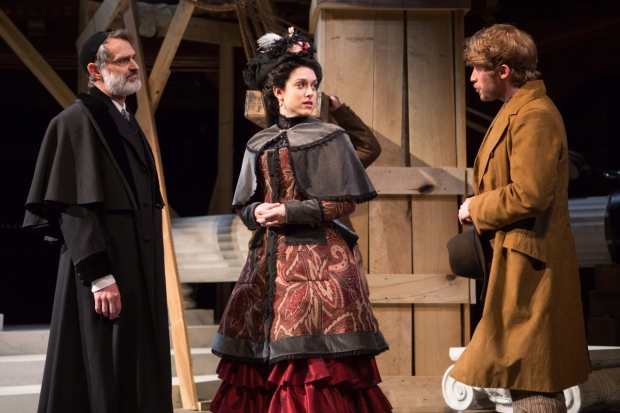District Merchants
Aaron Posner invents a new response to Shakespeare’s ”The Merchant of Venice”.

(© Teresa Wood)
There's no simple way to describe Aaron Posner's intelligent, provocative world premiere, District Merchants, at the Folger Theatre. It is more than an adaptation of Shakespeare's The Merchant of Venice, though much of its plot and many of its characters are inspired by that play. Perhaps the best way to characterize District Merchants is to call it a response to Shakespeare's original, with a new setting, issues, and certain characters that simultaneously pay homage to the structure, themes, language, and atmosphere of The Merchant of Venice.
Posner's play begins in the 1870s, in the post-Civil War Reconstruction era of Washington, D.C. Two actors appear: Shylock, an immigrant Jewish loan maker, and Antoine, a successful black businessman. As Shylock's and Antoine's lives become increasingly intertwined, the cynical, crafty men bring up many of the play's central topics, including the importance of money and physical property; the difficulty of keeping one's workers and one's children in line; the art of keeping a distance between oneself and certain minority groups (women, the poor, the powerless, etc.); and the intense need for, or mistrust of, religion.
Other thoroughly different attitudes belong to three pairs of young lovers, who believe in romance and in putting love above all else, including reason. These characters include Portia, a playful young woman who pretends to be a stern lawyer; Portia's lover, Benjamin; Shylock's daughter, Jessica, who hates being her father's "good, obedient girl"; Lorenzo, a simple lad impressed by Jessica's wealth; Nessa, Portia's maid; and Lancelot, who adores Nessa.
Posner dexterously weaves together the interests of these characters, giving them all – even the ones descended directly from Shakespeare's characters – new and fascinating personality traits. Director Michael John Garcés is on Posner's wavelength throughout, keeping the speed of the show lively, introducing occasional moments of slowed action, then resuming the play's normal quick pace.
Matthew Boston is excellent as the gloomy, angry Shylock, a man who feels that his God has betrayed him when Jessica runs away. Boston's Shylock fits Posner's own descriptions of the play most aptly, he is at times "complex," "uncomfortable," and "disturbing." Craig Wallace is an imposing, muscular presence as Antoine, the ultimate merchant, a godless fellow who counts costs only in terms of dollars and cents.
Maren Bush is a pure delight as Portia, both when she appears as a giddy, garrulous young woman and when she poses as a lawyer to deliver Shakespeare's famous "quality of mercy" speech.
Bush is most impressive when she is struck dumb upon receiving unexpected news, registering countless rapid, varying responses through her facial expressions alone. Seth Rue is delightful as Benjamin Bassanio, who courts Portia with courtesy and honesty.
Dani Stoller as Jessica, appropriately bristles at the way her father treats her as one of his belongings – when Lorenzo admires her money and Jessica thinks he is admiring her, she jumps at the chance for freedom. William Vaughan is excellent as Lorenzo, a simple country bumpkin. Nessa is beautifully played by Celeste Jones, who always indicates that she knows more than she should. And Akeem Davis energetically and convincingly creates the lovestruck Lancelot.
Tony Cisek's set design perfectly captures the spirit of the Reconstruction era. Floor-to-ceiling pillars crowd the stage. A huge hook that will be used to move those pillars hangs center stage, and there are ropes everywhere. Meghan Raham's costumes play with Reconstruction era designs: boots and shorter skirts for the women; bright, three-piece suits for the men. Christylez Bacon's music is a combination of moving spirituals and lively banjo and percussion tunes.
The subtitle of District Merchants is An Uneasy Comedy, and considering the role it gives to hatred, intolerance, bigotry, and racism, that's putting it mildly. And yet, it's a well-balanced play, as hopeful and joyous as it is revealing of bankrupt moral systems. Posner wanted to make his play "truthful and….worthwhile." And indeed, while Shylock and Antoine feel surrounded by oppression, Posner's younger characters seem to explode with the belief that they can change the future. While Posner doesn't offer easy answers, the sturdy balance among his characters does create something that feels very truthful, worthwhile, and profound.








